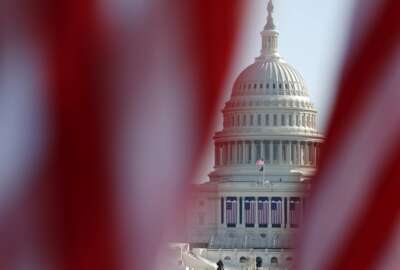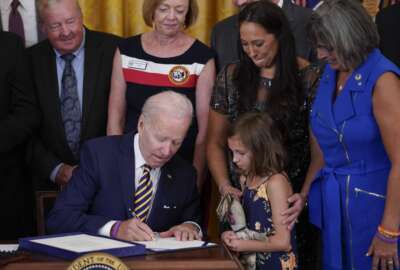Trust in government continues to decline
Public polling shows a continuing decline in Americans' trust in government. One indicator is the number of Americans who would urge their kids to pursue a...
Best listening experience is on Chrome, Firefox or Safari. Subscribe to Federal Drive’s daily audio interviews on Apple Podcasts or PodcastOne.
Public polling shows a continuing decline in Americans’ trust in government. There are obviously a lot of factors behind that, and a lot of noise in the data. But one indicator is the number of Americans who would urge their kids to pursue a government career. It was 56% as recently as 2010. This year, it’s down to 39%. Paul Light is a nonresident senior fellow in governance studies at the Brookings Institution and a professor of Public Service at NYU. For years, he’s tracked the data on what Americans want from government and how they feel about it. And he joined the Federal Drive with Tom Temin for more on how those numbers look right now.
Interview transcript:
Jared Serbu: All right, so let’s start off at a very high level. Can you just give us some of your top-level observations of where we are in terms of trust in government and demand for reform as of this summer?
Paul Light: Well, trust in government remains that near-all-time lows. Demand for reform is at historic highs. Now, we have a question when we say, how much reform does the federal government need: A great deal, a fair amount, not too much, none at all? Well, the number of Americans who want very major reform, is at a 30-year high. Now, the real question is, what do we mean when we say we want very major reform? Is that about Donald Trump? Is that about Joe Biden? Is that about Congress? What’s going on there? And we’re not sure. All we know is that there’s a lot of pressure out there to fix things and many Americans are saying they don’t see it.
Jared Serbu: Yeah, let’s stick with the partisan bit, just a little bit, because it seems like a totally reasonable hypothesis to me that this is all, or at least largely driven by just an increase in polarization and tribalism. As you point out in the paper, dissatisfaction with government is very heavily driven by who’s in the White House. And as you say, Republicans tend to want a lot more reform when there’s a Democrat in the White House and vice versa. So is there is there any way to control for that, and still get to a reliable conclusion that trust in government is waning or waxing in a particular time?
Paul Light: It’s so heavily anchored in partisanship, that you have to kind of pull the thing apart and say is there any common ground here at all? And the answer is, yes, there is. But there’s a lot of desire for payback, like you did this to Donald, now you’re doing that to him again, with that search warrant, etc. etc. And then the Biden folks are saying, wait a second, you did that to Barack and so forth and so forth, on down the line. Within that mess of partisan anger and sort of general feelings about the economy and international affairs, there is a broad agreement that Americans want the government to work, whatever it pursues. And they’re getting, we see at least inside the data, they’re getting pretty tired of the same old, same old. They’d like things to work a little bit better, and they’re tired of the stories about failure.
Jared Serbu: Yeah. Let’s talk a little bit more about the stories about failure. You do a clever thing in the research where you track breakdowns in the news and compare them against trust in government. You want to share a little bit more, your findings along those lines?
Paul Light: Well, the number has gone up dramatically. Our method starts with news interest, how many people are paying attention to the news of the day? And then the survey teams that do this, we’re not in that business. I have my end of the digging. We look at and we say, well, what are the big stories? Was there a government failure? And could it have been prevented? And that’s our methodology, we really grind down in there. Some things just can’t be avoided. The question, for example, about the Kentucky floods, it’s gonna rain in Kentucky. And there are going to be floods in Kentucky, there are infrastructure issues that help explain it. But did we do enough? Is that a breakdown? The answer to me is yeah. If we know that there’s that threat and Kentucky’s been an epicenter for these kinds of catastrophes for many, many years, why don’t we get to it? And that takes us then into the partisanship.
Jared Serbu: One thing I wonder, too, is how well do Americans understand what the federal government does versus state government versus local government versus everything else? Are they particularly good at assigning blame where it belongs when things go wrong?
Paul Light: No – it’s a great question and it’s a nice way to tee it up. I mean, we do look at the demand for major reform. At the federal level, state and local. Americans do have greater confidence in their state and local governments to do many things. Remove the snow, drive education reform at the K-12 levels, etc. etc. But when it comes to the big ticket reforms, large infrastructure, job creation, so forth and so on, you do see a difference in that. Americans do trust government, the government that’s closest to home, but they have very high demands for federal response to the big ticket problems that we all face. For example, the monkeypox vaccine, access to help during tough times, broad initiatives where Americans are saying, why isn’t the federal government doing something? And that’s state and local, as well.
Jared Serbu: And you’ve done some research just tracking big reforms enacted by Congress through the years and found that there just have not been very many in recent years. Do you see a connection there between the demand for reform and the fact that the government’s been kind of in stasis as far as how it operates?
Paul Light: Great question. The answers are all out there. All you have to do is go to the Government Accountability Office, and they’ve got answers for just about every federal government problem. And we’ve got lots of think tanks, my goodness, with answers to every possible angle, pitches on this, and that. What Americans are saying is, why don’t you do something and then deliver. We don’t have an absence, I would argue, of programs to fix some of the problems on the breakdowns list. What we have is a lack of commitment and a lack of energy on Capitol Hill. The government reform committees are near as I can tell moribund. We have a Senate government Operations Committee or House Government Operations Committee, and a Senate Homeland Security and [Governmentasl Affairs] Committee and I don’t see much coming out of those committees these days. I don’t even know that they’re still open. So we don’t lack for ideas for fixing government, we lack for some energy about it and some guts in confronting some of the key costs.
Jared Serbu: Before we get to what to do about all this. I just want to highlight one other data point that you have in the report, which is just that American support for having their kids go work for the government just is way down. How much has that fluctuated over the years, and why was it down so low right now?
Paul Light: We’ve got a very short timeline on it. But the recent drop is pretty significant. It suggests that Americans, at least parents here, and this is a hypothetical, if you had a son or daughter, would you recommend it? It suggests that there’s increasing resistance built around the polarization. And I think the polarization is so harsh right now, that there’s an embarrassment level from saying, Yeah, I’m going to go to work for the federal government. And we need to address that. We have the baby boomer brain drain, as you can tell from my hair color, which is absolutely, “grandpa color.” We’ve got a lot of baby boomers to replace at the federal, state and local level. Our Public Policy and Administration schools are doing okay, with enrollments. But there’s something happening here about public attitudes towards government as a noble career. I just don’t see much evidence of it. And there’s a big drop over the last four years. Could be Trump, could be a bit of Biden, could be just a general sense that we’ve had enough of the failures. But there’s good reason to worry about who’s going to be there when the baby boomers leave and we are going to leave, I assure you.
Jared Serbu: Yeah. And just getting back to the partisanship point. I wonder how much of that lack of support for government careers is just people equating government with politics. I see that in my own experience. When I tell people I cover the government, they think I cover politics, and I don’t.
Paul Light: Well look, part of the issue here is that you may have a tipping point effect. Yeah, we go through years after years, we know that if you got a Dem in the White House, the Rs are gonna say government don’t work. If you got an R in the White House, exactly the opposite. But there may be a tipping point effect here where parents and kids are saying look enough of that. Government is not stable. It is not reliable, a whole new set of descriptors. We don’t have the resources just yet to take a deep look at this, but it could be that 10, 15 years ago, you went to government because it was a good place to work, good salary, good pay. You could tell your parents about it and not be shamed, etc. etc. We may have crossed a tipping point now where it’s unreliable, we’ve got that conversation about schedules, a Schedule F, what is that about? You could fire my kid, because he or she looked at you the wrong way? What’s going on here? That could be a sign of a tipping point that we’ve really gone from sort of steady, “yeah, ain’t perfect, but a good place to work,” to really imperfect and it’s a very reluctant decision to make.
Jared Serbu: All right. Last thing before we let you go. Let’s talk a little bit about what what to do here. I mean, you talk briefly about the, as you said, moribund reform committees in Congress, but you put a lot of this on the president. Why, and what’s he need to do?
Paul Light: Like I’ve had contact with the Biden people for a long time. I worked on Capitol Hill for John Glenn. And Biden was a trusted actor in government reform work. He just does not seem interested in this topic. He doesn’t have a senior staff that has depth in this topic. OMB’s a little bit flat right now. Basically, what I see coming out of the White House on government reform is a wish and a prayer. They’re now talking about monkeypox, what could we do here? They’re about solving the problems after the effect, right? They’re basically saying, when it gets here, we’ll do something but that does not work. The issue here is a rising tide of breakdowns. They’re coming. They’re not being resolved. And I don’t think the Biden administration has been on its toes here, and they deserve a little bit of a push. You can’t wait until the disaster to figure out a way to fix it. Let’s get on with it, I think is my main point to the Biden people.
Copyright © 2025 Federal News Network. All rights reserved. This website is not intended for users located within the European Economic Area.
Tom Temin is host of the Federal Drive and has been providing insight on federal technology and management issues for more than 30 years.
Follow @tteminWFED






